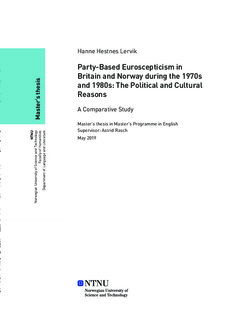| dc.description.abstract | The purpose of this master’s thesis is to show the difference between British and Norwegian party-based Euroscepticism during the 1970s and 1980s, and highlight the major cultural and political reasons for this difference. A thorough comparative study of party-based Euroscepticism in Britain and Norway has not been done earlier, and this thesis is an attempt to fill this gap and expand the existing knowledge on party-based Euroscepticism. The thesis has employed the method of comparative history, and has by discovering unique traits at a national level contributed to a greater knowledge on how party-based Euroscepticism differs in two relatively similar countries. The study argues that it is necessary to look at the memory of the past, and the countries’ political systems, and use these as frameworks in order to understand 1970s and 1980s Euroscepticism. The thesis is centred around a few chosen events and developments, as these represent party-based Euroscepticism at the time. These events are the 1972 referendum held in Norway, the 1975 referendum in Britain, the EEC entry negotiations, and the government breakdowns caused by Euroscepticism in both countries.
The differences found were caused by national identity, exceptionalism, type of governments, and referendum results. The countries’ national identity created a predisposition for scepticism towards the Community, whereas the type of government provided a political environment for party-based Euroscepticism where it could potentially be quite powerful. The referendum results shaped the mainstream attitude towards the Community, causing a pro-EEC stance to be the norm in Britain, and a mainstreaming of Euroscepticism in Norway. The thesis showcases the significance of these, and why they were able to affect and shape British and Norwegian party-based Euroscepticism during the 1970s and 1980s. These factors, and their impact, varied in the two countries, and shaped opposition towards the Community at the time. | |
